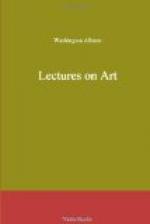But no one will assert that such a state was ever a consequence of the attainment of any object, however exalted. And why? Because the motive of action is left behind, and we have nothing before us.
Something to desire, something to look forward to, we must have, or we perish,—even of suicidal rest. If we find it not here in the world about us, it must be sought for in another; to which, as we conceive, that secret ruler of the soul, the inscrutable, ever-present spirit of Harmony, for ever points. Nor is it essential that the thought of harmony should even cross the mind; for a want may be felt without any distinct consciousness of the form of that which is desired. And, for the most part, it is only in this negative way that its influence is acknowledged. But this is sufficient to account for the universal longing, whether definite or indefinite, and the consequent universal disappointment.
We have said that man cannot to himself become the object of Harmony,—that is, find its proper correlative in himself; and we have seen that, in his present state, the position is true. How is it, then, in the world of spirit? Who can answer? And yet, perhaps,—if without irreverence we might hazard the conjecture,—as a finite creature, having no centre in himself on which to revolve, may it not be that his true correlative will there be revealed (if, indeed, it be not before) to the disembodied man, in the Being that made him? And may it not also follow, that the Principle we speak of will cease to be potential, and flow out, as it were, and harmonize with the eternal form of Hope,—even that Hope whose living end is in the unapproachable Infinite?
Let us suppose this form of hope to be taken away from an immortal being who has no self-satisfying power within him, what would be his condition? A conscious, interminable vacuum, were such a thing possible, would but faintly image it. Hope, then, though in its nature unrealizable, is not a mere notion; for so long as it continues hope, it is to the mind an object and an object to be realized; so, where its form is eternal, it cannot but be to it an ever-during object. Hence we may conceive of a never-ending approximation to what can never be realized.




